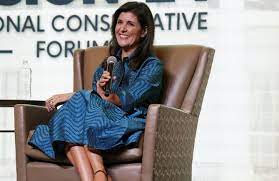Kerry Boyd Anderson
There is a growing divide among Republicans on how the US should respond to the war in Ukraine. The divide has been widening in the last few months, but the start of the race for the Republican presidential nomination is driving a new wedge between those who want to actively support Ukraine and those less dedicated to the fight. In general, foreign policy is not likely to be a top issue for most Republican candidates. Exceptions might be former ambassador to the UN Nikki Haley and former Secretary of State Mike Pompeo. So far on the campaign trail, former President Donald Trump has raised foreign policy mostly in terms of his past record as president. Most candidates will focus more on US domestic issues.
Republicans broadly agree that China poses the biggest foreign threat to US security and interests. Increasingly, Republicans are talking about the southern US border as a foreign policy problem. Countering Iran and supporting Israel are other areas of agreement. When it comes to another top foreign policy issue, the war in Ukraine, there is an intensifying debate within the Republican Party. While Republican leaders largely agree that the US should not send soldiers to fight in Ukraine or allow Kyiv a “blank check,” there is significant disagreement beyond those points.
The pro-Ukraine hawks view Russia as a major threat to US security and global interests. They share the view that the US and its allies play an important role in defending freedom around the world and that Russia seeks to undermine those efforts. The hawks believe in global “law and order,” and Russia’s invasion of a sovereign state violates international laws and norms. They also argue that freedom and stability in Europe is particularly important to US security and economic interests; if Russia succeeds in Ukraine, they warn that it could invade and otherwise threaten other European countries. Furthermore, the hawks argue that China is watching how Washington responds to Russian aggression in Ukraine; they argue that, if the US is irresolute in its support for Ukraine, China will assume that Washington’s support for Taiwan or other friends in the Pacific could waver.
Haley is the one foreign policy hawk, so far, who has announced that she is running for the presidency. She said that Russia threatens US allies, the war is a fight for freedom and that a Russian victory in Ukraine would encourage China and Iran to “become more aggressive.” She supports sending “conventional weapons” to Ukraine. Some other potential candidates have also expressed support for Ukraine and backed providing aid to Kyiv, including Pompeo, former Vice President Mike Pence, Sen. Tim Scott and Gov. Chris Sununu. However, the top two contenders for the Republican nomination have downplayed the threat from Russia and questioned US support for Ukraine. Trump, who has repeatedly praised Russian President Vladimir Putin over the years, recently said that opposing Russia is not a vital US national security interest. He also recently said that, if he were president, he would be willing to support Russia taking over some Ukrainian territory as part of negotiations.
Florida governor and likely candidate Ron DeSantis has significantly changed his rhetoric on Ukraine. When he previously served in the US Congress, he criticized the Obama administration for not doing more in response to Russia’s invasion of Crimea and other parts of Ukraine; he also called for sending defensive and offensive weapons to Ukraine. Today, however, he is taking a very different position. He recently stated that “becoming further entangled in a territorial dispute between Ukraine and Russia” is not a vital national interest for the US. He said that Washington should focus on securing its border. In addition to differing views of the war in Ukraine among potential presidential candidates, there is disagreement within the broader Republican Party.
Several influential figures have declared strong support for Ukraine, including Senate Minority Leader Mitch McConnell and Sen. Marco Rubio. Sen. Lindsey Graham criticized DeSantis’ position on Ukraine, even referring to it as “the Neville Chamberlain approach” – referencing the British prime minister whose efforts to appease Adolf Hitler failed to prevent the Second World War. However, some other Republican leaders are reluctant to provide strong, ongoing support for Ukraine. House Majority Leader Kevin McCarthy has expressed reluctance to continue spending large sums of money on the war, and a few Republicans in Congress have called for ending aid. Multiple polls show that Republican voters are increasingly wavering on the issue, though a slight majority still supports sending US weapons to Ukraine.
Republicans who are uncertain about or opposed to support for Ukraine draw on several arguments. Many Republicans want to focus more resources on US domestic needs. Also, many ask why the US can offer significant support to Ukraine but cannot secure its own southern border. In general, many of these Republicans downplay the threat that Russia poses to US interests. A smaller segment expresses sympathy and admiration for Russia and Putin. President Joe Biden strongly supports Ukraine and has sufficient backing in Congress to maintain large amounts of military and economic aid.
If Biden runs and wins reelection in 2024, or if a Republican hawk becomes president, then US support for Ukraine would likely continue. However, if Trump or DeSantis becomes the Republican nominee and wins the White House, then Ukraine could not rely on US assistance. Moscow is certainly hoping to see a change in US policy, while Kyiv will be watching with concern.







